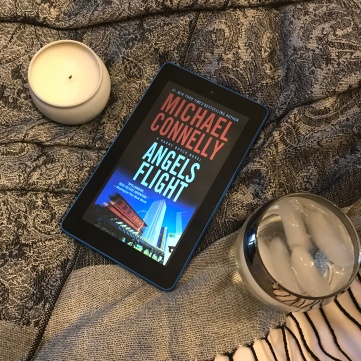
Towards the end of 2018, I read a lot of thrillers and procedurals. For a few months I burned my way through recent works by Lee Child, Michael Connelly, John Sandford, and others. It’s a genre I binge on every couple of years, catching up on what I’ve missed since the last time the urge hit me. They’re fun, light reads, and as long as you’re willing to suspend some disbelief, they’re pretty entertaining.
A few weeks into the binge, though, I stated having a tiny bit of difficulty combating my disbelief. Don’t get me wrong-I’m still enjoyed the books, but my “seriously?” moments seemed to be coming a little more frequently. I mean, how many times will even the most “maverick” police detective commit illegal searches, destroy evidence, or cover up a killing? For me, these eye roll moments are more amusing than anything else, but it did pique my curiosity, so I brought up the subject with a few police officers I know. Let me tell you, that was an interesting conversation. The two officers both said that they had difficulty reading or watching procedurals, because they just couldn’t turn off the fact-checking part of their brains. They had lots of examples, and I actually learned a lot about how police investigations work. During our talk, I also noticed that the two officers had very different emotional reactions to the topic. One was ruefully amused, while the other became seriously annoyed.
Reflecting on that conversation led me to conduct some totally unscientific research to see how other people reacted to their jobs or circumstances being inaccurately portrayed in fiction. Luckily, I have a wide circle of acquaintances, so I was able to get some broad perspectives.

Here are a few highlights:
- Attorneys discussed rules of evidence, discovery, and trial procedure. One spoke at length about the myth of the “courtroom gotcha”.
- Teachers lamented the portrayal of classrooms as either highly engaged learning meccas or difficult classes that magically turn around when the right teacher inspires them. “I’m not saying it doesn’t happen,” one teacher said, “but Hollywood makes it look so easy.”
- Medical professionals cited examples ranging from speed of recovery to treatment protocols.
- A journalist contrasted the glamour of dashing around chasing a story (Hollywood) to the mundane hours spent on research and fact checking (reality).
I discovered that once I got them going, people had a lot to say about fictional inaccuracies. They talked about dating, marriage, parenting, travel, and even pet ownership. I also found that once again, there was a range of attitudes, from “It’s hilarious” to “Whatever, it’s fiction” to “It makes me crazy”.

Continuing my completely unscientific analysis, I found a few factors that seemed to influence people’s reactions:
- The aforementioned teacher was not alone-many people commented on how fiction downplays the difficulties involved in various tasks and industries.
- The happier people were with their job/situation/life, the more likely they were to shrug off fictional inaccuracies. Those who were struggling or frustrated tended to really get annoyed while they talked about how authors, filmmakers, etc. get it wrong.
Did I come to any earth-shattering conclusions? No. Did I have a lot of really interesting conversations? Absolutely. In the end, it was definitely something worth discussing.

What do you think? How much does it bother you when art fails to accurately imitate life? Any particularly interesting examples? Let’s discuss!

I encounter this all the time when writing. It’s tough to know if you should portray a job realistically or Hollywood interesting for narrative reasons.
The one that always gets me is hackers. I work for an ISP, so I get trained about this, and real world hacking does not involve tapping at a computer and saying “I’m in.” it’s mostly either social engineering by scamming the human elements of a system, or running a program that they’ve already written that tests common passwords.
LikeLiked by 2 people
What was the show that had that crazy scene with the two hackers trading keyboards or something like that? Was it NCIS?
I’ll bet there are so many technology related eye rolls happening…I should have thought to talk to the IT department at work when I was doing my “research”.
LikeLiked by 2 people
That was definitely NCIS. I’m pretty sure they were trying to parody or poke fun at bad hacking scenes… Or I just really want to believe that was the case. And they were sharing the same keyboard, it’s painful to watch!
LikeLiked by 1 person
Movies are made for “shock and awe” factors.. like slapstick comedy, there’s an audience that will enjoy it no matter what.
These series that the History Channel have put out over the years are despicable.. I mean, we’re talking history here, yes it’s not gonna be entertaining or sexy to keep a typical movie watcher entertained. But! It’s history! Keep it true and don’t jazz it up for ratings. I do frown upon this.
Now yes, we’re talking about me who reads encyclopedias and find them intriguing. I understand that some can handle a boring truth over an exaggerated entertainment. But label things properly. Hence, the History Channel should have said this is a fictional interpretation of history.
End of rant.
LikeLiked by 1 person
I definitely agree about truth in advertising when it comes to history. I enjoy a good historical documentary, and sometimes I like historical fiction (that’s really on a case by case basis), and I definitely want to know when something has been partly fictionalized. I can just imagine history teachers wanting to bang their heads into the wall when students come in with some crazy “fact” they got from TV.
LikeLiked by 1 person
Lol!! I feel that way about history and biblical things… please people! Take some civic duty, a little initiative and study things for yourselves… History Channel, Discovery and the Sci-Fi channel are owned by the same company!
LikeLiked by 1 person
Maybe it should be called fake fiction. Oh, not just writing. The story of the HS kids harassing an elderly man in Washington turned out that the man’s group
had instigated the whole thing, and it was caught on a 2 hour video.
https://nam03.safelinks.protection.outlook.com/?url=http%3A%2F%2Fpreserveconservativevalues.com%2F2019%2F01%2F20%2Fdebunking-hoax-proof-teens-never-harassed-native-american%2F&data=02%7C01%7C%7C0fa79e1fc7a44f9acf8c08d67ef8200e%7C84df9e7fe9f640afb435aaaaaaaaaaaa%7C1%7C0%7C636836001480776607&sdata=mrGCfBlQI4%2F%2BsLmAxAipToWCPWNLxvd6GxmOlUF5SJI%3D&reserved=0
LikeLike
Fascinating research, and I agree that fiction often portrays reality very poorly; however, isn’t that partly why we read fiction – to escape reality for a wee while? Otherwise, we would all be reading biographies, etc. all the time. 🙂 I acknowledge that there are books that are poorly researched, and I still enjoy them – it might just be to chuckle at the inaccuracies!
LikeLiked by 1 person
Definitely. I love fiction, so I’m well aware of its limitations. Lol. I think I noticed it more because I was binge reading, which got me curious. What I found so interesting was the wide variety of people’s reactions.
LikeLiked by 1 person
I work in IT and, invariably, as soon as computers are used as a plot point, I know I am going to reach a point where I think: “That just can’t or wouldn’t happen.”
I think the thing is that fiction reflects our stereotypes of various jobs. These stereotypes are almost certainly all wrong to a greater or lesser degree and the people who work in the job being portrayed will tend to notice this.
LikeLiked by 1 person
I imagine it’s very difficult to find the line between accurate portrayal and losing your audience. What I’ve found most interesting is the wide range of reactions to the inaccuracies. It’s so interesting how people can respond so differently to the same portrayal.
Do you find the computer inaccuracies frustrating, unimportant, or somewhere in between?
LikeLiked by 1 person
I think that’s true, The reality never fits the stereotype, and things would probably get a bit dull if we insisted on everything being completely realistic.
For me, it depends on how significant it is to the plot. If the inaccurate portrayal is a minor point then I don’t tend to care much. If, on the other hand, the entire plot rests on something that can’t happen then I will struggle to suspend my disbelief.
I think, also, that the genre matters. I have recently finished reading The Atrocity Archives and had no problem with the idea of computer scientists summoning nameless horrors, because that’s the sort of book it is. On the other hand, if a novel is set in the real world, then I will be very quick to roll my eyes when the author starts to get basic facts wrong.
LikeLiked by 2 people
You’re right…the expectations of accuracy that are set up for us definitely have an impact on what we’re willing to overlook.
LikeLiked by 2 people
I satirized Robert Ludlum novels after reading several of them. It’s pretty easy to do because they know what sells and what their readers want: A human weapons who just wants to be left alone, a betrayal somewhere in the higher echelons of the military or CIA and a qualm-free villain…
Lee Child, though, disappointed me with one of his novels in which the victims were HYPNOTIZED into killing themselves… something refuted long ago. So, I MAY read another Jack Reacher novel some day… but, when credulity is stretched that far, the reader tends to rebel…
LikeLiked by 1 person
What really cracked me up about the early Reacher novels is the frequency of coincidence. He gets off a bus and stumbles into a mystery. His bus breaks down, and he’s in a mystery. He gets picked up hitchhiking, and he’s in a mystery. Some of the other setups are easier to swallow, but overall there’s a lot of suspension of disbelief required for a Lee Child novel. They’re the sort of books I pick up when I’m looking to turn my brain off and just be entertained for a while.
Ludlem requires a little more mental energy.
LikeLiked by 1 person
Yeah, almost like Reacher should be riding around with a Mystery Van and a cowardly great dane…
Read any Eric Lustbader?
LikeLiked by 1 person
A few, I think, some years ago. Didn’t he write Dark Homecoming?
LikeLiked by 1 person
He might be more your preference… less convoluted than Ludlum…
LikeLiked by 1 person
I’ll have to give him a try. What book would you recommend?
LikeLiked by 1 person
Go with the Ninja books that he did.
LikeLiked by 1 person
Will do!
LikeLike
Most of life is a series of repetitive motions so it’s no wonder fiction writers feel the need to jazz things up. I do the same although I try to be true to what things are actually like and not over-inflate things. .
LikeLike
I noted with some amusement that you didn’t include accountant’s here. Hollywood doesn’t bother with auditors and accountants as we are just to boring. I thought your post was very good. It is true that fiction can be inaccurate but that seems to be more with movies and TV shows. Most authors go to great lengths with their research to be factually accurate.
LikeLiked by 1 person
You’re right…I’ve been trying to think of examples of accountants in media, and I’m drawing a blank.
LikeLiked by 1 person
I don’t get bothered by it in fiction unless it’s seriously off. I want a good story not a Dream with suspense. I too enjoy good crime stories and the authors you shared are some of my favorites.
LikeLiked by 1 person
I definitely enjoyed the binge read.
LikeLiked by 1 person
I so enjoyed this read. I plan to re-read!
LikeLiked by 1 person
Thank you!
LikeLiked by 1 person
I wanted to add that I have read all the Giles Blunt mysteries and anxiously await his next. They are of course centered around a cop and solving murders in Ontario.
LikeLiked by 1 person
I haven’t read those. I’ll have to check them out.
LikeLike
It’s been awhile Amanda but I started with Black Fly Season. Sounds gross but what a mystery!
LikeLike
I think that since so much fiction is character driven and the plot is the vehicle for character arcs, we downplay the importance of nagging little details. But then that is our job as writers — to educated ourselves (if not in the draft, in the revision) about what is or is not possible. We need to leave the poetic license to poets and Hollywood, and we can do the Write-What-You-Know thing by researching as thoroughly as possible, and then SHELVING the work until we find either an editor or a beta reader from that culture/life experience/nationality. While we cannot control the Muse, we can control taking literal dictation… I have at least three such short stories going nowhere until I find a qualified reader…But to lessen the pain of massive revisions, researching before drafting is really best…otherwise it is like herding cats to find all the errors needing correction and plot elements made useless if not embarrassing!
LikeLiked by 1 person
It’s such an interesting debate. People fall all across the spectrum, from “I don’t care-it’s fiction” to “I want everything to be accurate”. I’ve been thinking about it since before I wrote this post, and I think that, as a reader, I fall somewhere in the middle. At a minimum, I want stories to be internally consistent. I also find that if stories are well-written overall, I’m likely to limit myself to an eye roll or snarky comment and then keep reading.
The thing I keep going back to as I reflect on the conversations I had before writing this post is the impact of the personal element. The fact that so many people were much more annoyed by inconsistencies in things that were part of their own lives suggests, I think, that an author who strives for accuracy whenever possible is likely to appeal to more readers by avoiding those emotional reactions.
LikeLiked by 1 person
Agreed. Plus I think it creates a distraction for the reader to discover an inaccuracy — one that dogs them through the rest of the book/story, or worse — leads them to walk away from the tale entirely.
LikeLiked by 1 person
Very true.
LikeLiked by 1 person